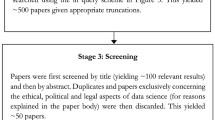Abstract
On the occasion of the 150th birthday of Georg Cantor (1845–1918), the founder of the theory of sets, the development of the logical foundations of this theory is described as a sequence of catastrophes and of trials to save it. Presently, most mathematicians agree that the set theory exactly defines the subject of mathematics, i.e., any subject is a mathematical one if it may be defined in the “language” (i.e., in the notions) of set theory. Hence the nature of formal definitions plays an important role within the logical foundations of mathematics. Its study is also helpful to answer the question of how it is possible that the set theory as a universal new ontology for the subject of mathematics (as people hoped around 1900) totally failed but nevertheless the language of set theory is successful in all the mathematical practice.
Similar content being viewed by others
Literatur
Ω-Bibliography of Math. Logic (Ed. G.H. Müller, W. Lenski), Vol. V (Ed. R. Blass), Set Theory, Springer 1987.
Brouwer, Luitzen E.J.:Over de Grondslagen der Wiskunde. Dissertation. Amsterdam 1907.
Burali-Forti, Cesare: „Una questione sui numeri transfiniti”.Rendicondi circolo matematico di Palermo 11 (1897), 154–164.
Cantor, Georg:Gesammelte Abhandlungen, herausgegeben von Ernst Zermelo. Springer: Berlin 1932. Reprints Hildesheim 1962, Berlin-New York 1980.
Cantor, Georg:Briefe, hrsg. von Herbert Meschkowski und Winfried Nilson. Springer: Berlin-Heidelberg usw. 1991.
Cohen, Paul J.: „The Independence of the Continuum Hypothesis”.Proceedings National Academy Sciences USA 50 (1963), 1143–1148, 51 (1964), 105–110.
Dauben, Joseph W.:Georg Cantor. His Mathematics and Philosophy of the Infinite. Harvard University Press: Cambridge Mass, 1979.
Fraenkel, Adolf: „Über die Zermelosche Begründung der Mengenlehre”.Jahresbericht DMV 30 (1921), 97f.
Fraenkel, Adolf:Über den Begriff „definit” und die Unabhängigkeit des Auswahlaxioms. Sitzungsberichte Akademie Berlin 1922, Math.-Phys. Klasse, 253–257.
Fraenkel, Abraham A, Bar-Hillel, Yehoshua:Foundations of Set Theory. North-Holland Publishing Comp.: Amsterdam 1958, second revised printing 1973.
Gödel, Kurt: „Die Vollständigkeit der Axiome des logischen Funktionenkalküls”.Monatshefte Math. Phys. 37 (1930), 349–360.
Gödel, Kurt: „Über formal unentscheidbare Sätze der Principia Mathematica und verwandter Systeme I”.Monatshefte Math. Phys. 38 (1931), 173–198.
Gödel, Kurt: „The consistency of the axiom of choice and the generalized continuum-hypothesis”.Proceedings National Academy Sciences USA 24 (1938), 556f.
Goodstein, R.L.: „On the restricted ordinal theorem”.Journal Symbolic Logic 9 (1944), 33–41.
Grattan-Guinness, Ivor: „An Unpublished Paper by Georg Cantor: Prinzipien einer Theorie der Ordnungstypen. 1. Mitteilung”.Acta Mathematica 124 (1970), 65–107.
Grattan-Guinness, Ivor: „Georg Cantors Influence on Bertrand Russell”.History and Philosophy of Logic 1 (1980), 61–93.
Hartogs, Friedrich: „Über das Problem der Wohlordnung”.Mathemat. Annalen 76 (1915), 438–443.
Hausdorff, Felix:Grundzüge der Mengenlehre. Veit & Comp.: Leipzig 1914. Reprints. New York 1949, 1965.
Hilbert, David: „Mathematische Probleme”.Nachrichten Königl. Gesellschaft der Wissenschaften Göttingen, math.-phys. Klasse 7 (1900), 253–297, siehe auch: „Die Hilbertschen Probleme”.Ostwalds Klassiker 252, Akadem. Verlagsgesellschaft: Leipzig 1971.
Kirby, L., Paris, J.: „Accessible independence results in Peano arithmetic”.Bulletin London Math. Society 14 (1982), 285–293.
Kuratowski, Kazimierz: „Sur la notion d'ordre dans la théorie des ensembles”.Fundamenta Mathematicae 2 (1921), 161–171.
Löwenheim, Leopold: „Über Möglichkeiten im Relativkalkül”.Math. Annalen 76 (1915), 447–470.
Mal'cev, Anatoli I.: „Untersuchungen aus dem Gebiet der math. Logik”.Matemat. Sbornik 1936, 323–336.
Meschkowski, Herbert:Probleme des Unendlichen. Leben und Werk Georg Cantors. Vieweg: Braunschweig 1967. Erweiterte Neuauflage als:Georg Cantor. Leben, Werk und Wirkung. Bibliograph. Institut: Mannheim-Wien-Zürich 1983.
Mittelstraß, J.:Wissenschaft als Lebensform. Frankfurt a. M. 198a (S. 16).
Potter, Michael D.:Sets. Oxford University Press 1990. Deutsch:Mengentheorie. Spektrum: Heidelberg-Berlin-Oxford 1994.
Purkert, Walter, Ilgauds, Hans-Joachim:Georg Cantor. Birkhäuser: Basel-Boston-Stuttgart 1987.
Radbruch, Knut:Mathematik als Vehikel der Philosophie und Weltanschauung. Univ. Kaiserslautern, FB Mathematik, Preprint Nr. 259, 1995.
Russell, Bertrand, Whitehead, Alfred North:Principia Mathematica, 3 vols. Cambridge University Press 1910–1913.
Schoenflies, Artur (gemeinsam mit Hans Hahn):Entwickelung der Mengenlehre und ihrer Anwendungen. Teubner: Leipzig-Berlin 1913.
Schreiber, Peter:Grundlagen der Mathematik. Deutscher Verlag der Wissenschaften. Berlin 1977, 2. Aufl. 1984.
Schreiber, Peter:Grundlagen der konstruktiven Geometrie. Deutscher Verlag der Wissenschaften: Berlin 1984.
Schreiber, Peter: „Felix Hausdorffs paradoxe Kugelzerlegung im Kontext der Entwicklung von Mengenlehre, Maßtheorie und Grundlagen der Mathematik”. In:Felix Hausdorff zum Gedächtnis (hrsg. Egbert Brieskorn). Vieweg: Wiesbaden 1996, 135–148.
Skolem, Thoralf: „Logisch-kombinatorische Untersuchungen über die Erfüllbarkeit oder Beweisbarkeit mathematischer Sätze”.Skrifter utgit av Videnskapsselskapet i Kristiania I, Math.-phys. Klasse 1919, No. 4, 1–36, auch in:Selected Works in Logic, Oslo 1970.
Skolem, Thoralf: „Einige Bemerkungen zur axiomatischen Begründung der Mengenlehre”.Wiss. Vorträge 5. Kongress skandinav. Math. Helsingfors 1922 (publiziert 1923).
Whitehead, Alfred North: „On cardinal numbers”.American Journal of Mathematics 24 (1902), 367–394.
Whitehead, Alfred North: „The logic of relation, logical substitution groups and cardinal numbers”.American Journal of Mathematics 25 (1903), 157–178.
Wiener, Norbert: „A Simplification of the logic of relations”.Proceedings of the Cambridge Philosophical Society 17 (1914), 387–390.
Zermelo, Ernst: „Beweis, daß jede Menge wohlgeordnet werden kann”.Mathemat. Annalen 59 (1904), 514–516.
Zermelo, Ernst: „Untersuchungen über die Grundlagen der Mengenlehre I”.Mathemat. Annalen 65 (1908), 261–281.
Author information
Authors and Affiliations
Additional information
Der 150. Geburtstag Georg Cantors, des Begründers der Mengenlehre, am 3.3.1995, lieferte den Anlaß für diesen Vortrag, der in unterschiedlichen Versionen am 7.3.1995 am Fachbereich Mathematik der Ernst-Moritz-Arndt-Universität Greifswald, am 12.6.1995 beim Cantor-Kolloquium der Universität Halle und am 17.6.1995 auf der 3. Tagung der Fachsektion Geschichte der Mathematik in der DMV (Deutsche Mathematiker-Vereinigung) gehalten wurde.
Rights and permissions
About this article
Cite this article
Schreiber, P. Mengenlehre—Vom Himmel Cantors zur Theoria prima inter pares. NTM N.S. 4, 129–143 (1996). https://doi.org/10.1007/BF02913788
Issue Date:
DOI: https://doi.org/10.1007/BF02913788




